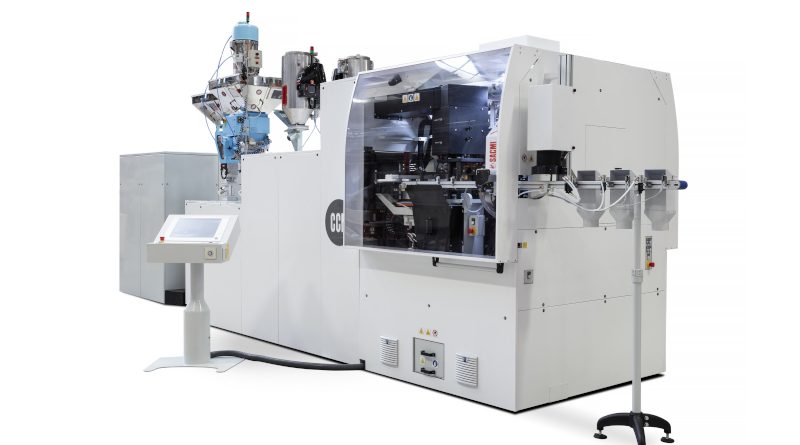Sustainability and recyclability
Sacmi, Hall 13, Booth A63
The common thread running through all the new Sacmi products at the K show is sustainability. The solutions on display demonstrate means of reducing the amount of virgin resin used in processes and augmenting opportunities for complete recycling, in accordance with circular economy principles. It will be showing how the use of larger quantities of recycled resins, to the point that they constitute the bulk of materials employed to produce containers is already a reality.
Sacmi will be showing its IPS220 injection preform system, which can make 100% rPET preforms and use up to 50% recycled PET flakes, using standard machines and hot runners.
Both the IPS220 and IPS400, with 96 and 128 cavities respectively, are designed for fast size changeovers and, on the larger version, compatibility with most commercially available resins. The solution showcased at the fair is an intrinsically sustainable ‘native’ solution that requires no modifications to the machine.
Artificial Intelligence (AI)
The company will be presenting Computer Vision, which it says is the first complete system for the on-line identification of abnormal stress on preforms via a combination of polarised light and advanced AI algorithms. Polarised light inspection has been impossible to perform directly on-line because traditional algorithms were not up to the task. Sacmi says it has succeeded in replacing traditional, manual sampling checks with a fully automated control system.
The PVS10L on the stand will demonstrate how the new control system enables ‘self-learning’ required checks. This simplifies QC procedures and enables operators to work directly on the line without having to manually set complex and changing inspection recipes. Sacmi says that developments of AI algorithms, used in conjunction with traditional video camera inspection techniques, are being driven by the need to simplify the system. The possibility of fielding new checks and, at the same time, simplifying the checks themselves with systems that can self-learn, address the most complex inspection needs of the plastics and metal graphics industries, while minimising waste and optimising process costs. The ultimate goal is to extend QC from inspection of every product to government of the entire production process, maximising line efficiency by objectively identifying problem types and origins.
Multilayer compression
CCMM (Continuous Compression Multilayer Moulding), developed and marketed since early 2019, is designed to combine established Sacmi compression with user-friendliness, process consistency and shorter cycle times. Initially focused on the manufacture of single serve capsules for coffee, tea and other foods and drinks, development projects have resulted in the capacity to manage a broad range of materials and minimise rejects, through improved process consistency.
Compression Blow Forming
Sacmi CBF (Compression Blow Forming) is designed to enable manufacturers to precisely produce plastic containers directly from pellets, helping to lower average raw material consumption and augment the humidity barrier effect by up to 40%. First prototyped by Sacmi in 2004, the single-stage CBF method consists of a continuous plastic extrusion process in which the outflowing material is cut into pellets. These are then inserted in an open mould and compressed to make a preform. It is not cooled completely but regulated to a temperature that allows immediate blow-moulding.
CBF offers weight reduction of up to 10% and, therefore, less raw material consumption and containers that augment the humidity barrier effect by 30-40%, for the pharmaceutical packaging industry. The possibility of replacing traditional PS and PE resins with PET, especially in the dairy field, lets customers take a step towards the circular economy without having to do any further work on production lines. Solutions on the Sacmi stand will be an application for the pharma sector, alongside some PET dairy container samplings.
CBF is equipped with a video camera container inspection system. It has been designed as an open system, suitable for installation on the line with other Sacmi or third party machines, and has a greatly reduced footprint. Compression works at lower temperatures than other technologies, lowering energy and raw material consumption requirements. EVOH barrier film can be inserted between the different layers, sealing in the organoleptic qualities of products like coffee without any need to act on secondary packaging. Sacmi says that its CCM multilayer compression allows producers to choose the number and type of layers to insert, according to the specific product being packaged. The tie layer can be managed separately in dedicated layers, reducing required quantities and thus preserving the purity of the polypropylene, at lower cost.

